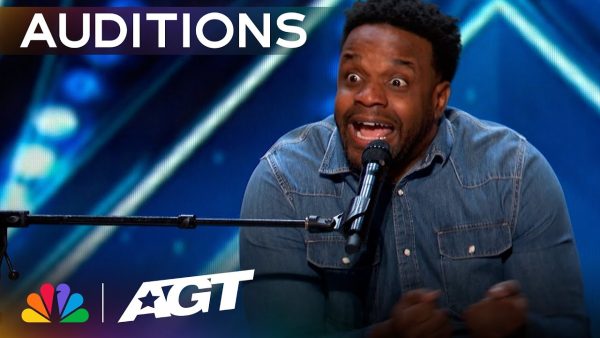The stage lights of America’s Got Talent pulsed bright against the velvet curtains as the next act was introduced. The theatre, already buzzing from previous performances, quieted with anticipation. Onto the stage walked Barry Brewer—a Chicago-born comedian, actor, and musician—with an easy grin and the kind of self-assurance that made the audience lean forward before he even spoke a word.
Dressed in a crisp jacket and jeans, Barry didn’t carry props or rely on flashy visuals. He walked with something far more magnetic: a storyteller’s charm and the musical instincts of a seasoned performer.
“Good evening,” he said, flashing a warm smile at the judges. “You ready for a little church?”
The crowd chuckled, unsure of what was about to unfold. They were about to find out.
The Setup
Barry began with a story from his childhood in Chicago, where Sunday mornings meant church pews filled with voices, clapping hands, and a band that played with a fervor unmatched anywhere else.
“See,” he explained, pacing across the stage, “when you go to a Black church, the music isn’t background—it’s the main event. The musicians aren’t just playing hymns; they’re putting on a whole concert.”
Laughter rippled through the crowd. The judges smiled, already hooked by the authenticity of his delivery.
The Piano Moment
Then Barry strolled over to the piano waiting at the side of the stage. He cracked his knuckles, sat down, and with exaggerated seriousness, placed his hands on the keys.
“Now, you think you’re about to hear ‘Amazing Grace,’ right?” he teased.
The audience chuckled.
Instead, Barry launched into a dramatic, thunderous chord, his body swaying like a man possessed. His fingers sprinted across the keys in flamboyant riffs, every note exaggerated, every pause comically long.
“This is how church musicians play,” he said between flourishes. “‘Jesus Loves Me’ turns into a Stevie Wonder encore.”
The audience roared.
The Judges Lose It
Simon Cowell leaned forward, trying to suppress a grin but failing. Sofia Vergara slapped the desk, laughing so hard she nearly tipped her drink. Howie Mandel clapped with delight, nodding in recognition of the musical precision beneath the comedy. Heidi Klum covered her face, giggling uncontrollably.
Barry wasn’t just joking about the music—he was performing it. He mimicked the way musicians would glance at the choir, daring them to keep up. He shifted into falsetto, imitating a singer wailing high notes while the pianist played as though channeling an entire orchestra.
The judges were doubled over by the time Barry leaned back dramatically from the piano, as if finishing a Broadway finale.
Storytelling and Style
What made Barry’s act unique wasn’t just the jokes—it was the lived truth behind them. He shared quick anecdotes about growing up, about sneaking glances at the musicians during church when the sermon dragged too long, about how every simple song became a spectacle.
“You can’t even sing ‘Happy Birthday’ in a Black church,” Barry quipped, diving into another musical imitation. He pounded the keys, spun it into a jazz riff, and finished with an exaggerated gospel run that had the audience howling with laughter.
Every detail was specific yet universal. Even those who had never set foot in his kind of church understood, because his delivery painted the picture so vividly.
A Standing Ovation
As Barry wrapped up, he lifted his hands dramatically from the keys, letting the final chord ring into silence. The audience exploded into applause, whistles and cheers echoing off the rafters. People jumped to their feet, clapping in unison.
The judges rose too, smiling wide, caught up in the infectious joy of the performance.
“That,” Howie Mandel declared, “is how you do comedy. You didn’t just tell jokes—you brought us there. I felt like I was sitting in that church.”
Sofia Vergara wiped tears of laughter from her eyes. “I couldn’t breathe! It was so funny but also so real. You are amazing.”
Heidi Klum leaned forward. “I’ve never seen anything like that. You are a natural entertainer.”
Simon Cowell, who rarely dished out praise so freely, nodded. “I think you’re brilliant. You’ve got originality, timing, and incredible musical talent. That was one of the best comedy auditions I’ve seen in years.”
Backstage Buzz
As Barry left the stage, still grinning, the backstage crew erupted into applause of their own. Contestants waiting for their turn gave him high-fives, some shaking their heads at how tough it would be to follow his act.
Barry’s phone lit up with notifications within minutes of the episode airing later that week. Clips of his routine spread rapidly across social media. Hashtags like #BarryBrewerAGT and #ChurchComedy began trending. People shared stories of their own church experiences, laughing at how perfectly he had captured them.
More Than Comedy
What set Barry apart wasn’t just his punchlines but the way his comedy felt inclusive. His routine wasn’t mocking—it was celebrating. He honored the musical passion of Black churches even as he exaggerated their quirks for laughs. In doing so, he created a performance that connected deeply across cultures and generations.
For Barry, this was more than a set. It was a moment of recognition, the culmination of years of grinding in clubs, acting in television projects, and sharpening his craft on small stages before stepping into AGT’s spotlight.
A Lasting Impression
By the end of the night, Barry Brewer’s audition wasn’t just another comedy routine. It was a standout act of the season, one that reminded audiences how laughter could bridge experiences and how music—even in parody—could bring people together.
As he walked off into the wings, still hearing echoes of applause, Barry knew he had done more than tell jokes. He had invited the world into a familiar piece of his life and, in doing so, brought joy to millions.
And for America’s Got Talent, his performance would be remembered as one of those rare moments when comedy didn’t just make people laugh—it made them feel like they were part of the story.
